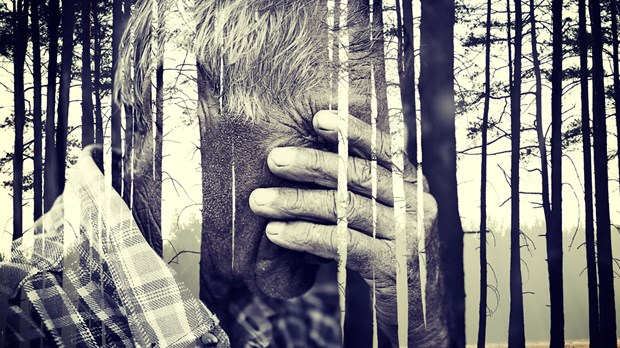
I think I have seen enough to make my diagnosis.” Those are the words I heard in December of 2012. After a lifelong struggle with unexplained symptoms, I was diagnosed with a genetic disorder called Ehlers-Danlos syndrome (EDS) and learned that my body makes defective collagen. Collagen is found all throughout the body, and therefore my entire body is affected, making me prone to dislocations and bruises. While I can do some fun tricks, like scratch my ear with my toe, I can’t unload the dishwasher or go for a walk without risk of a dislocation or fall. EDS is painful, frustrating, and scary.
Sometimes, I just want God to tell me why—that is the universal question after all. Why? Why am I suffering? Or better yet, why does anyone suffer? I have friends who are transplant recipients or cancer survivors, and I know those who have bipolar disorder or autoimmune diseases. Some have kids on the autism spectrum or spouses with depression. These friends have, like me, cried out to God for relief. For healing. For answers. And we’re all still waiting.
Who’s at Fault Here?
During my journey to diagnosis, I often wondered if my symptoms were my fault. After all, sin has consequences. Everything God created was “very good,” but the Fall came, and sin messed everything up.
Jesus’ disciples were aware of this when they met a blind man in John 9. They asked Jesus, “Rabbi, why was this man born blind? Was it because of his own sins or his parents’ sins?” (verse 2).
There have been women in my life who’ve asked similar questions. Some echoed the disciples, suggesting God’s healing was delayed because I had unconfessed sin or was under a “generational curse.” Perhaps if those dear women had read the rest of the blind man’s story they would have chosen their words differently. Jesus informed his disciples that “It was not because of his sins or his parents’ sins” (verse 3).
Yes, sin has consequences. Sometimes our poor choices can cause illness. However, my dad’s gambling habit is not the reason I dislocated my hip stepping off a curb last week. Your disobedience to your mother many years ago isn’t the reason you have a child who’s in and out of the hospital. It doesn’t work like that. But if our DNA is not a direct result of our sins, why are we in these circumstances?
After Jesus let the blind man and his parents off the hook, he said something else in verse 3: “This happened so that the power of God could be seen in him.” Maybe the blind man’s story is about redemption—not just for him, but also for his neighbors, who would soon witness Jesus’ great healing power. Perhaps this would draw them to Jesus.
Today, this story gives me hope and a sense of purpose. At the time of diagnosis, however, it gave me very little comfort. To me, it implied I was a pawn on a chessboard. It felt like God was getting the glory at my expense, or throwing me under the bus so someone else could benefit.
Those options don’t sound very loving in the face of suffering.
God with Us
While I’ve realized since my diagnosis that God didn’t deliberately cause my suffering exclusively for others to benefit, I still don’t really understand why we suffer.
But maybe I’ve been asking the wrong question. What if my journey is less about why God does what he does and more about who God is?
When I read the Bible, I don’t see God just hanging out on the fringes, aware of what’s going on in people's lives but not really engaging with them. Instead, I see that he is intimately involved in our lives. For example, Psalm 139 says God knows us so well that he knows our thoughts before we do. He knows what we do and where we go.
And God sees us. When I was in my mother’s womb, God saw me. Not even my wacky collagen gene was hidden from him. This kind of seeing is not a casual glimpse. It is meticulous observation. God sees as intimately as he knows us.
Psalm 139 also says no matter where we go, to the top of the sky or the ends of the earth or the depths of the sea, God is there. He is continuously interacting and intervening with all he created, including humans. He has appeared as a person and as a burning bush. He gave us the Ten Commandments, not as a bunch of rules doled out by a controlling bully but as boundaries to keep us safe, to bless us, and to keep us close to him.
Even when the Israelites lost their homeland and were carted off to a strange country with strange customs, God was there. And then God sent Jesus. Completely sinless, he took our sin and paid the penalty so that we could be restored to relationship with him.
God never abandons us or leaves us to our own devices. He wants to be near his kids. He wants to be near me and you. That’s pretty comforting.
The ever-present God, who intimately knows and completely sees, made me. In Psalm 119:73, the word translated made means “refined,” and fashioned means “to bring order.” I was formed, woven, knit together. I was fearfully and wonderfully made. All God’s works are wonderful. I was not thrown together carelessly—God didn’t forget an ingredient in my DNA. There was love and purpose and care involved. I don’t understand it, but I do my best to trust that he knows what he is doing.
How Do We Respond?
We don’t get to choose how we’re made or what our circumstances are, but we can choose our responses to the God who made us and put us in those circumstances.
We can choose not to believe in God at all. Or we can choose to view God as a bully, thinking he willingly inflicted harm on us or took the laissez-faire approach and abandoned us. We can choose to be disappointed and bitter, regardless of what we believe in.
But I can’t choose to be angry with God. Sometimes I feel angry about my situation, and sometimes I vent that anger to God—but not at God. Whatever the details of how and why I was made, snarling at God won’t help matters. Turning my back on God would mean walking the road on my own, in my own strength, without my best friend. That would be pretty lonely.
God made me. He understands better than any doctor exactly what is wrong. He knows how to make me better. Since he is good and loving, it seems to me he would want to help me, comfort me, and strengthen me to walk the road I’m on. If I’m looking for a purpose in all this messiness, I’ll find it in him. If I’m looking for comfort, I’ll find it in his arms. If I need strength, I’ll hold his hand. If I’m not sure how to view myself, I’ll look into his loving eyes.
On this side of heaven, without God’s miraculous healing, we struggle. But we don’t have to struggle without hope. In this life, we may never get the answer to why, but our questions do not fall on deaf ears. With God, we are being renewed, redeemed, and transformed—in our minds, souls, and spirits (2 Corinthians 4:16).
Someday, I will dance before God on streets of gold (Revelation 21:21). I will run and not grow weary . . . or hurt myself (Isaiah 40:31). Today, I will choose to dance on the inside; dancing to the music my Creator sings over me (Zephaniah 3:17). And that is very good.
Diana Prange is the senior production coordinator and the development coordinator for Christianity Today. She has a master's level certificate in Christian ministry from Northern Seminary and will be participating in a walk this month to raise awareness about EDS.
Read more articles that highlight writing by Christian women at ChristianityToday.com/Women
 Read These Next
Read These Next



 Pizza Crust Is Not My FriendQuick fixes, prayer, and learning to be still
Pizza Crust Is Not My FriendQuick fixes, prayer, and learning to be still
 Intimacy Is More Important than You ThinkWhy it’s the secret to feeling better
Intimacy Is More Important than You ThinkWhy it’s the secret to feeling better








 Homepage
Homepage